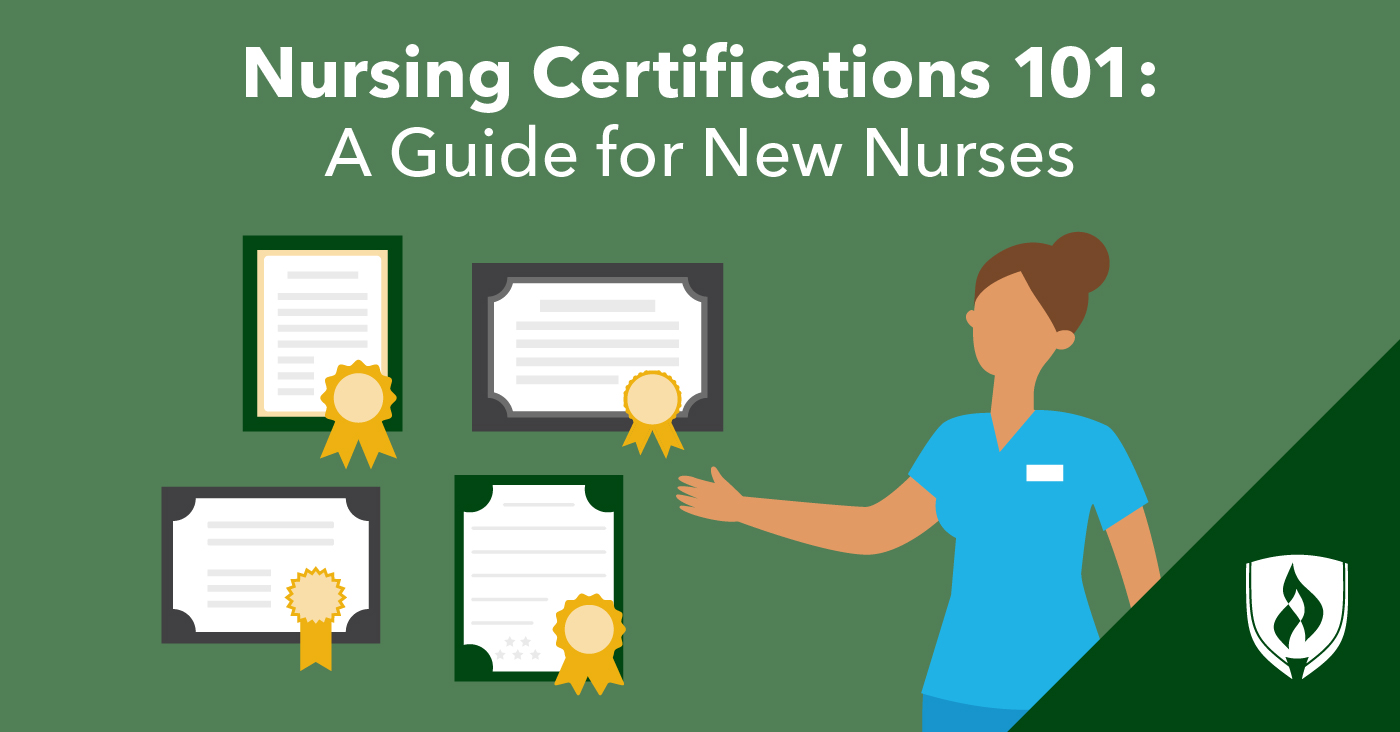
Any time you enter a new career, one of the major questions revolves around what it will take to develop your skills for long-term success. Outside of advancing your nursing education, one of the most straightforward ways to boost your nursing resume and specialize in your field is by pursuing certifications. While the world of certifications is vast and probably a little intimidating, the process of finding the right professional certification in nursing doesn’t have to be challenging.
To help you better understand nursing certifications and their role within healthcare, we’ve laid out three main questions to get you started: How important are certifications, which certifications are the most common and when is the right time to pursue certifications.
How important are certifications to employers?
Certifications matter to employers for a number of reasons. Certifications are tied to nurses providing higher-quality patient care, a result that healthcare systems obviously value. They also indicate commitment and competence to hiring managers and peers alike.
These benefits definitely make certifications attractive to employers. A research report conducted by Relias® notes that certified nurses have more job opportunities, more opportunities for professional advancement and increased earning potential.1
Check out our article "8 Things Employers LOVE to See on a Nursing Resume".
What nursing certifications are employers most commonly seeking?
To help answer this question, we used analysis software to review over 1.4 million registered nursing job postings from the past year.1 The results are best broken up into two general categories—basic certifications and specialty nursing categories. Let’s take a look at some of the “basic” options first.
Basic nursing certifications
Don’t let our use of the term basic downplay their importance—the following certifications are often considered a requirement for employment.
- Basic Life Support (BLS) certification involves learning CPR, using an AED (defibrillator) and training in the American Heart Association’s® chain of survival.
- Advanced Cardiovascular Life Support (ACLS) certification is a key certification for anyone that has plans to work in an emergency or intensive care setting. ACLS certification expands on the BLS certification by going deeper into the handling of different conditions, like strokes or heart attacks and topics like airway management.
Specialty nursing certifications
Specialty nursing certifications can be an appealing option for nurses seeking to bolster their credentials for working with specific types of patients or care environments. The following list is by no means exhaustive but should provide a solid overview of some of the most common options out there.
- Pediatric Advanced Life Support (PALS) certification is key for any nurse who wants to work with kids. Similar to the BLS and ACLS certifications, this certification verifies you have essential pediatric life support skills.
- Certification in Infection Prevention and Control (CIC)® is a common option for nurses looking to verify their expertise in infection control best practices.
- Neonatal Resuscitation Program (NRP)® is a certification that gives nurses the most up-to-date skills to save a newborn’s life. The course consists of learning resuscitation, chest compressions, preterm neonatal care and end-of-life care for a neonatal patient.
- Certified Emergency Nurse (CEN)® is a certification for nurses who wish to continue to develop their expertise in emergency care. This certification is at the top of the list for anyone who wishes to work in critical/emergency care.
- Certified Case Manager (CCM) is a certification option for nurses who want to demonstrate their expertise in providing the right services to patients across the spectrum of care. This typically includes patients dealing with complex medical conditions or catastrophic injuries.
- Nationally Certified School Nurse (NCSN)® is a nursing certification for anyone who wants to work with children in a school setting.
- Critical Care Registered Nurse (CCRN)® is a series of certifications that nurses can get to work with critically ill patients whether they are adults, children or neonatal.
- Certified Nurse Educator (CNE)® is a certification for those who also have a passion for education and want to play a role in helping equip their peers to excel in their work.
When is the right time to get certified?
Most certifications require some form of on-the-job experience, so this isn’t a matter of racing out into the world to register for as many certifications as you can handle. While the two basic certifications will be immediately helpful, specialty certifications should come with your experience as you figure out what branch of nursing best fits you. Each certification has unique prerequisites—so the first step of any certification process is to do some research.
If you’re eyeing a specialty certification, it may help to ask nurses who’ve already attained certification or those who have significant experience in the best-fitting role for you. Keep in mind, very few of these certifications above are prerequisites to employment, so you most likely can take your time and be selective about your efforts.
Standing out in your career as a nurse
Now that you have the basics of certifications, you are one step forward in standing out in your field. The good news is that certifications aren’t the only way to stand out as a nurse. If you are interested in reading about other ways to differentiate yourself from your nursing peers, check out our article “Nursing Career Advancement: 8 Ways to Stand Out in Your Scrubs.”
Related Articles:
1Burning-Glass.com (analysis of 1,483,625 registered nurse job postings, Dec. 01, 2020 - Nov. 30, 2021)
American Heart Association is a registered trademark of American Heart Association, Inc.
CIC is a registered trademark of Certification Board of Infection Control and Epidemiology, Inc.
Neonatal Resuscitation Program is a registered trademark of American Academy of Pediatrics Corporation.
CEN Certified Emergency Nurse is a registered trademark of Board of Certification for Emergency Nursing Corporation.
NCSN is a registered trademark of National Board for Certification of School Nurses Corporation.
CCRN is a registered trademark of AACN Certification Board.
Certified Nurse Educator is a registered trademark of National League for Nursing, Inc.
Relias is a registered trademark of Relias LLC.




